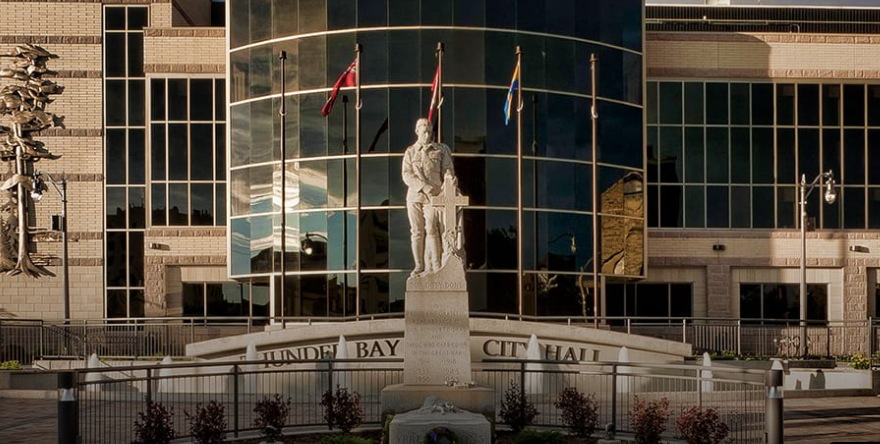THUNDER BAY – City council spent much of Monday focused on development in Thunder Bay's outlying areas, offering rezoning approvals for a new Neebing subdivision and considering a developer's pitch to begin planning for new development in the Oliver Road area west of the city.
Council also rejected a request to join a living wage campaign, accepting a recommendation that found it would be too expensive and largely benefit student-aged employees.
With the public gallery at city hall once again open to the public, a pair of advocates for a proposed indoor turf facility were on hand, wearing shirts emblazoned with their message that waiting is costing players opportunities, as well as millions for the city as estimates have risen.
The proposed infrastructure project remains on hold as the city awaits an answer on an ask for up to $22 million in federal funding.
"It was very important for us to portray to council and to our members that we're here, and we're not going away," said Michael Veneziale, president of Soccer Northwest. His group is hoping to ensure the current council moves forward with some solution involving a full-sized field before its term expires in October.
New Neebing subdivision set for approval
A new, 69-lot subdivision in the Neebing area has won rezoning approval from city council.
The single-family housing development will sit north of the South Neebing Community Centre, with the developer footing the cost for a new road entry from Highway 61. Future phases of development contemplate secondary access to Mountain Road.
Shore Bay Estates modified its proposal to address earlier environmental concerns raised by the Thunder Bay District Health Unit, putting three of the lots on hold to slightly reduce density, avoiding the need to use tertiary septic systems, which the health unit has opposed (the homes will instead use traditional septic fields).
The land in question was rezoned for development by council on Monday. The draft plan of subdivision still requires a separate vote of approval at an April 11 council meeting.
City won’t join living wage campaign
City council has voted not to join a campaign in which employers pledge to pay a “living wage” calculated to keep workers out of poverty, based on the local cost of living.
Councillors agreed almost unanimously with a recommendation from administration not to join the campaign, as the Lakehead Social Planning Council had requested.
A report found applying the local living wage of $16.30 to part-time employees would cost the city over $580,000.
City expanding bylaw enforcement
The city’s bylaw division is entering a restructuring process that will make municipal enforcement officers available on weekends and evenings, after securing a key agreement with the Canadian Union of Public Employees (CUPE), council heard.
Mayor Bill Mauro said the arrangement will help fill a key gap and hopefully allow reduce the burden on the Thunder Bay Police Service.
The restructuring was approved as part of the 2022 budget, adding roughly 3.5 positions increasing the department’s budget by more than a third. Recruitment is underway to fill the new positions and the new model could launch as soon as the summer, the city said.
Developer pitches city on plan for development in outlying areas
A local developer says the city isn’t doing enough to encourage housing availability in outlying areas of the city, pitching council on an arrangement in which it would conduct key planning processes on behalf of the city.
Developer Silvio Di Gregorio told council his company, Di Gregorio Developments, is willing to pay for a large part of the work to develop a “secondary plan” for an area north and south of Oliver Road to the west of the city, currently identified as an area designated for future growth.
A secondary plan is required before full city services could be extended to the area. It would still take years before the move would result in homes being built, Di Gregorio said.
He argued developing the area will be necessary to keep up with demand for new housing supply in the city. It’s a suggestion that was received eagerly by some councillors, who pointed to CEDC estimates that a regional mining boom could require hundreds of new home builds in the coming years. Other councillors said they want to ensure the city is doing everything it can to focus development in more urban areas.



